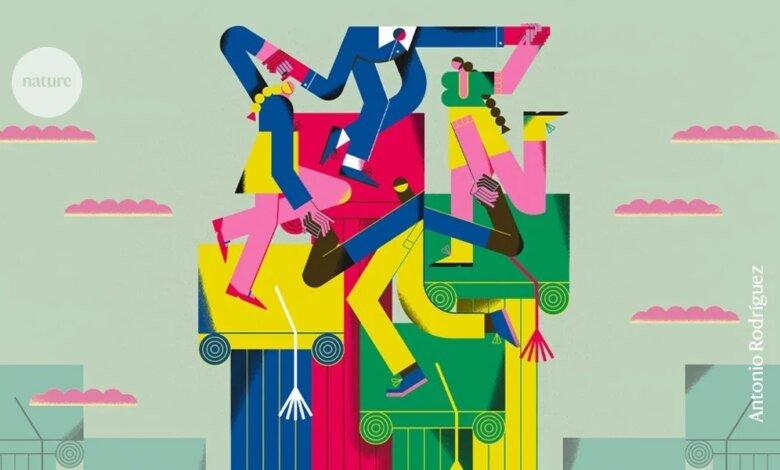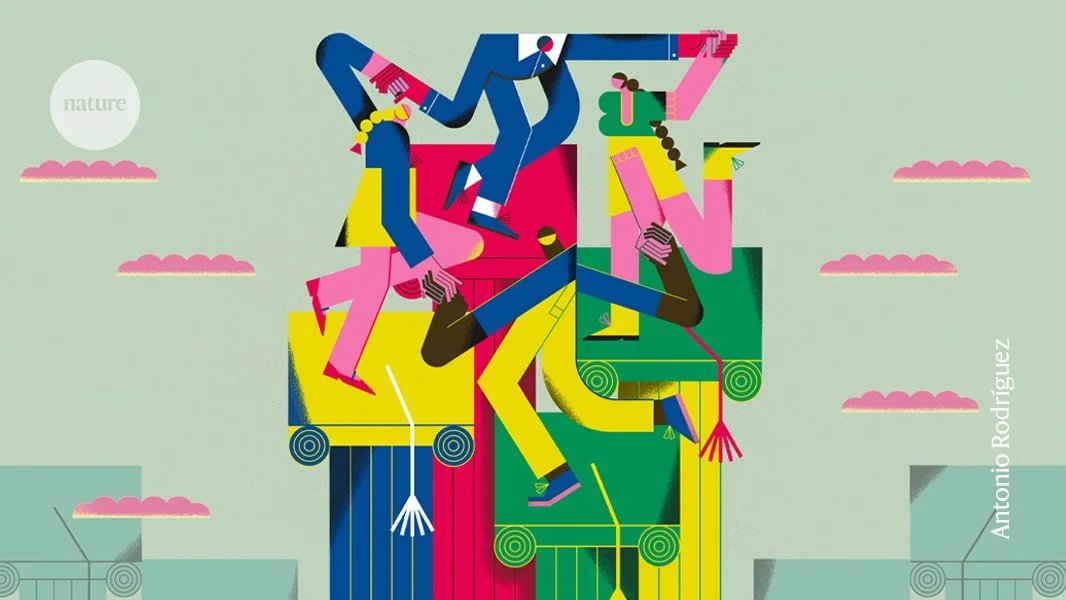Are these the happiest PhD students in the world?…


The past few years have been tough on Camila Pinto, who earned her PhD at the Federal University of Amazonas in Manaus, Brazil, in March. During her degree, she lost both her parents and had burnout and depression. Yet, her overall PhD experience was positive.
“We say in my lab that ‘life happens during a PhD’, and many personal dramas unfold,” says Pinto, a materials scientist who has now embarked on a postdoc and holds a salaried teaching position at Brazil’s Federal Institute of Amazonas in Presidente Figueiredo, a small town in the heart of the Amazon rainforest. “What helped me keep going was the personal support of my supervisor, the solidarity of our national scientific community and the belief that my research serves a greater good.”
Pinto’s positive outlook might be a national characteristic. When Nature surveyed more than 3,700 doctoral candidates around the world earlier this year, Brazil stood out: 83% of respondents studying there reported being at least moderately satisfied with their PhD programme. It is the only country scoring significantly higher than the global average of 75%. Students in Brazil were also the most upbeat about their experience, with 80% saying that they enjoyed their degrees and 78% feeling fulfilled by their work, compared with global averages of 70% and 72%, respectively.
The global PhD landscape 2025
The only country that comes close to Brazil is Australia, which matches it on enjoyment and fulfilment, and scores just one point lower on satisfaction. Students in Australia and Brazil are also the most likely to say that their PhD experience matched their expectations, with 68% in Australia agreeing with this statement (including 29% who strongly agree) and 65% in Brazil (27% strongly agree).
Does that mean that these nations have the happiest PhD students in the world? In reality, the picture is more complex than that.
Brazil’s survey data offer no clear reason for why the country has the highest satisfaction score. Its respondents are significantly less likely than the global average to have concerns about a lack of mentoring (15% compared with 26%) and more likely to be satisfied with the intellectual challenge (92% compared with 81%). They also express a slightly higher-than-average satisfaction with their pay, supervisor relationship, research guidance and independence — although not significantly so. Meanwhile, they are less likely than average to be satisfied with their work–life balance and travel opportunities, and more likely to say that their university has a culture of long working hours. Indeed, when it comes to many of the individual measures, Brazil is outscored by the United Kingdom, which had an overall satisfaction score of 76% — close to the global average (see ‘PhD student satisfaction across five countries’).
Worldwide, the survey identifies three measures that correlate with satisfaction. PhD students who spend at least one hour a week with their supervisors are significantly happier than average, as are those who are less than two years into their degree. Spending more than 60 hours a week on their PhD correlates inversely with satisfaction. Financial concerns, despite being high in most surveyed countries, don’t correlate with satisfaction levels in an obvious manner. In Germany, where some of the fewest students responded having financial concerns (27%), overall satisfaction is below average at 70%. So what’s really going on?
Sandra Dias, a cancer researcher at the Brazilian Center for Research in Energy and Materials in Campinas, thinks that her country’s cultural emphasis on community could play a part, as could its social support structures. “Universal health care, subsidized public transport and, for many, proximity to extended family reduce financial and emotional stress,” she says. A mild climate that enables outdoor activities year-round also helps, she adds.
Engineering PhD student Izadora Menezes disagrees that Brazil’s students are the happiest, not least because of financial concerns resulting from stagnating stipends and research budget cuts.Credit: Izadora Rhaynna Santos de Menezes
However, Izadora Menezes, who studies engineering at Brazil’s Federal University of São Carlos, disagrees with the idea that the nation’s PhD students are the happiest in the world. “Although I am satisfied with my personal experience with my PhD, I don’t think it reflects the reality in Brazil,” she says. Money is a key issue, she notes. Under then president Jair Bolsonaro’s far-right government from 2019 to 2023, scholarships stagnated and funding for science was slashed. Although Menezes’s scholarship from the São Paulo Research Foundation FAPESP is relatively generous, PhD stipends in the country can be as low as 3,100 reais a month, she notes. Although that is equivalent to a monthly allowance of US$1,250 in the United States, it is “usually insufficient for a comfortable life”, says Menezes. (Stipend values have been adjusted throughout to US dollars using a measure of purchasing power parity.)
Pinto thinks that the country’s high satisfaction rate might stem at least in part from relief that Bolsonaro’s presidency, which she calls a “dark chapter” for research, is over. “We are still struggling to rebuild much of what was lost, but for the first time in a long while, there’s a renewed sense of optimism,” she says. “That hopefulness is part of our DNA.”
Southern satisfaction
Like Brazil, Australia’s high satisfaction score is not immediately explained by Nature’s data. The country’s 101 respondents rate their satisfaction above average on most measures — for example, 58% of Australia-based PhD students feel satisfied with their work–life balance compared with 51% globally. But only the questions about tailored mental-health support and travel opportunities scored significantly higher than the global average.
Lifestyle factors, including outdoor culture and relatively safe living conditions, also add to improved well-being, says Eddie Attenborough, who studies food, bioprocesses and polymer science at Monash University in Melbourne, Australia. “When you’re happier outside of the lab, you’re more likely to feel fulfilled inside it,” he adds. Jesse Gardner-Russell, an ophthalmology PhD candidate at the University of Melbourne and national president of the Council of Australian Postgraduate Associations (CAPA), thinks that the country’s social safety nets are important, including free or subsidized health care for most PhD students, a diverse university culture in which international students feel welcome and a good work–life balance. “I think that all of this fits together to create satisfaction.”
Eddie Attenborough says that outdoor lifestyles improve students’ satisfaction in Australia.
The high proportion of international PhD students in Australia’s sample (63%) could also influence its satisfaction score. Globally, students doing a PhD abroad report significantly higher satisfaction than do those studying at home (78% compared with 74%).
Life in Australia is, however, expensive. Although the proportion of students reporting financial concerns (47%) is only slightly above the global average (42%), cost of living is consistently the top worry in CAPA’s surveys, Gardner-Russell says. A typical PhD stipend of Aus$33,500 a year (US$24,300) is below Australia’s minimum wage of around Aus$49,000. over, unlike salaried jobs, stipends do not contribute to a pension plan, placing doctoral students at a disadvantage compared with their non-academic peers, he explains. “This can make PhD students feel very undervalued.”
How money, politics and technology are redefining the PhD experience
Whereas Australia and Brazil scored high across the board, Italy offers a more nuanced picture. Overall, the country scores on a par with Australia: 82% of its 111 respondents say that they are at least moderately satisfied with their PhDs. But when asked whether they enjoy their degrees and feel fulfilled by the work, students in Italy score significantly lower than in the other two nations, with only 68% agreeing on both measures. They are also significantly less satisfied than average about pay, independence and work–life balance and have more concerns about their mental health.
Maria Roberta Belardo, who studies mathematical and physical sciences at the Scuola Superiore Meridionale in Naples, Italy, says that the country’s results reflect its complex academic landscape. Italian universities provide quality education, she says, but the pay is low — the average monthly stipend is €1,200 (US$1,960) after deductions — and the research community is small by European standards. Belardo says that many of the country’s PhD students are sustained mainly by their passion for their research topic. “In other words, Italian PhDs may feel proud of the degree they earn, while at the same time finding the experience itself less enjoyable and the professional outlook less secure, which, in my opinion, explains the mixed results of the survey.”
ADI, the Association of PhD Students and Postdocs in Italy, says that its 2024 survey, which received responses from some 7,000 PhD students in 2023, found that about half were at high risk of anxiety, depression and stress, caused mainly by economic insecurity, excessive workloads and uncertainty about the future. “In our opinion, if Italian PhD students declare themselves satisfied (in Nature’s survey), this satisfaction cannot be interpreted as an indication of idyllic living and working conditions. It could instead reflect a kind of ‘resilience’ or perhaps the prevalence of a ‘passion’ for research, which masks the daily difficulties,” says the ADI’s national secretary Davide Clementi, who is based in Palermo, Italy.
Disclaimer: This news article has been republished exactly as it appeared on its original source, without any modification.
We do not take any responsibility for its content, which remains solely the responsibility of the original publisher.
Disclaimer: This news article has been republished exactly as it appeared on its original source, without any modification.
We do not take any responsibility for its content, which remains solely the responsibility of the original publisher.
Author: uaetodaynews
Published on: 2025-10-20 16:22:00
Source: uaetodaynews.com




